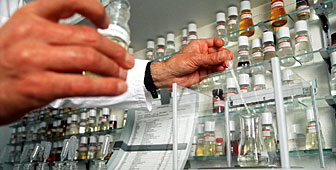New Aids drug raises hopes and prices

A new drug, developed by Swiss pharmaceutical firm Roche, may prevent HIV from entering the body's cells but high cost could limit its use.
The results of clinical trials released on Monday showed that the drug, known as T-20, significantly reduced the amount of HIV in the blood of patients.
Roche said the injectable drug, the first in a novel class of medicines known as fusion inhibitors, could reach the market as early as next year.
However industry analysts say an estimated price of $10-12,000 per patient a year could pose a serious challenge to access.
New approach
Current Aids medicines block replication of the virus after it attacks a cell. T-20 stops HIV from entering the cell in the first place.
Results of two clinical trials released at the international Aids conference in Barcelona, Spain, showed that T-20 was twice as effective at ridding the body of the virus as existing HIV therapies.
“We can show that levels of HIV in the blood are significantly reduced when T-20 is used in conjunction with an individually chosen anti-HIV combination,” Roche spokesman, Alexander Klauser, told swissinfo.
In the first trial, 37 per cent of patients taking T-20 had no detectable virus after 24 weeks against 16 per cent in patients taking older drugs only.
A second study showed a success rate of 28 per cent against 14 per cent. Most of the patients involved had serious drug resistance problems.
Drug resistance
Resistance to Aids medicines, caused by the rapid mutation of HIV, is a growing problem.
Researchers estimate that most patients have developed resistance to at least one drug while nearly a third no longer respond to a cocktail of a least three medications.
“Thirty to 50 per cent of patients are infected with a strain of the virus which has developed resistance to one or more anti-retrovirals thereby reducing the treatment options available,” said Klauser.
Roche and the United States biotech firm, Trimeris, who released the results, plan to file for regulatory approval of T-20 in the second half of this year. The US Food and Drug Administration has promised a fast-track review.
Price barrier
The two companies have yet to disclose how much the drug will cost but Roche admits it will be expensive.
David Reddy, head of Roche’s HIV franchise, said T-20 was the most complicated protein Roche had ever produced, with the manufacturing process requiring 106 steps of chemical synthesis.
“It is going to be more expensive than the other HIV drugs,” he said. The most expensive anti-retroviral treatments on the market currently cost about $11,000.
The drug looks set to escalate the debate over how much even wealthy nations are willing to pay for new advances in Aids treatment.
Potential vaccine
Because T-20 is a lengthy protein chain means it must be given as injection rather than a pill, since it would be broken down in the gut before reaching the bloodstream.
This week’s Aids conference is also hearing about developments in other approaches to the disease.
One idea is to rebuild the immune system, which the virus wrecks. Meanwhile, American company, VaxGen, announced on Monday that an Aids vaccine could be available within five years.
by Vincent Landon

In compliance with the JTI standards
More: SWI swissinfo.ch certified by the Journalism Trust Initiative
You can find an overview of ongoing debates with our journalists here . Please join us!
If you want to start a conversation about a topic raised in this article or want to report factual errors, email us at english@swissinfo.ch.